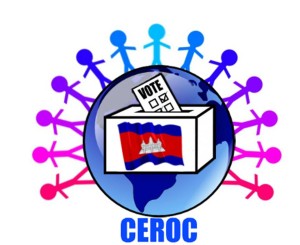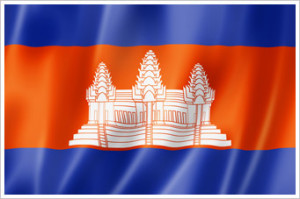
CEROC public logo
(Courtesy of Sovann Khemara)
A research article by Center for Immigrant Studies articulated on the importance of having dual citizenship abroad to vote in their home countries.
- Voting is one of the essential elements for citizenship and a critical part of belonging to a political community.
- Voting is the heart of civic responsibility.
- Voting can help their home countries with an advantages of social and economic development.
- Voting is one principal way of organizing and extending their influence and of reestablishing and reinforcing immigrant ties to their “home” countries.
Note that, there are many other arguments the paper has illustrated. Please, read this paper for more conceptualized framework.
Dual Citizens May Be Banned From Prime Minister Role
Emerging from a meeting on electoral reform Monday, senior ruling party lawmaker Cheam Yeap said that the government is considering modifying Cambodia’s nationality law to ban those with dual citizenship from running for the office of prime minister.
Mr. Yeap, who represented the CPP at the second meeting of the new joint-party Electoral Reform Committee on Monday, explained that the change, which he said would help prevent treason, would not be introduced immediately but was one of the government’s long-term plans.
“We want the prime minister to have only a single nationality, and not two nationalities,” Mr. Yeap told reporters after the meeting.
“For example, if someone has two nationalities—one French and one Khmer—when the Khmer have a dispute with the French, which side will that prime minister take?” Mr. Yeap asked.
“This will take a long time and will be in the nationality law.”
Opposition leader Sam Rainsy, who lived in Paris until 1993 after his family was exiled under then-Prince Sihanouk in 1965, holds dual French and Cambodian citizenship. The CNRP president has twice fled to France to avoid criminal convictions—most recently between 2009 and 2013—in a case brought against him by the government.
Mr. Rainsy said by telephone Monday that he would be prepared to renounce his French citizenship if the ruling CPP introduced such a measure.
“Of course I would give up my French citizenship,” he said. “I would give up my life for this country, this is only a minor problem.”
Mr. Rainsy said he no longer needed France as a “safe place” to flee what he termed intimidation and violence from the ruling CPP.
“This has been a strength,” Mr. Rainsy said. “But now my strength is the support of the Cambodian people. With this strength, and with the overwhelming and growing support of the Cambodian people, I am invincible. I do not need anything else.”
Read more…


